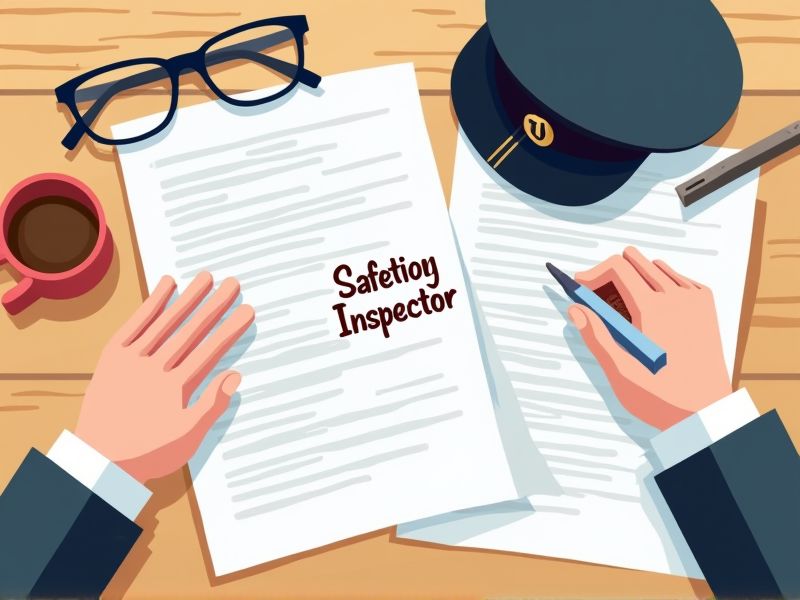
Aviation Safety Inspectors are entrusted with ensuring compliance with aviation regulations and maintaining high safety standards. Due to the complex nature of aircraft systems and aviation operations, these inspectors require specialized knowledge and expertise. Specific certifications validate their skills and understanding in areas like airworthiness and operational standards. Important certifications are essential for anyone pursuing a career as an Aviation Safety Inspector.
FAA Airframe and Powerplant (A&P) Certification
The FAA Airframe and Powerplant (A&P) Certification ensures that aviation safety inspectors possess the technical knowledge necessary to evaluate aircraft maintenance and safety standards effectively. This certification provides inspectors with a comprehensive understanding of aircraft systems, crucial for identifying potential mechanical issues that could compromise safety. Certification enhances credibility and trust from aviation entities and personnel, leading to more effective oversight and collaboration. Adhering to these standards results in safer air travel by minimizing the risk of mechanical failures through rigorous inspections and maintenance practices.
FAA Inspection Authorization (IA)
The FAA Inspection Authorization is essential for ensuring that Aviation Safety Inspectors possess the expertise to evaluate complex maintenance work on aircraft. With IA, inspectors have the authority to approve or disapprove major repairs and alterations, which impacts overall airworthiness. Rigorous qualifications and continuous training for IA holders lead to adherence to safety standards and reduce potential aviation risks. IA status ensures that inspections are conducted by professionals well-versed in the latest aviation regulations and practices.
FAA Aviation Safety Inspector Training Certificate
The FAA Aviation Safety Inspector Training Certificate ensures that inspectors possess the necessary technical knowledge and skills for regulating and overseeing aviation safety standards effectively. Aviation safety inspectors are responsible for maintaining the safety and compliance of aviation operations, which requires specialized training and certification. Comprehensive training prepares inspectors to evaluate aircraft, pilot certifications, and operational procedures critically. This certification helps maintain high safety standards and public confidence in aviation governance.
Safety Management Systems (SMS) Certification
Safety Management Systems (SMS) Certification equips Aviation Safety Inspectors with a structured framework to identify potential hazards, improving risk management and mitigation strategies. By adhering to standardized safety protocols, inspectors can consistently enforce regulations across the industry, reducing the likelihood of accidents. Certification ensures inspectors are up-to-date with current safety practices, which enhances trust and compliance within aviation operations. The systematic approach of SMS allows for continuous monitoring and improvement, ensuring that aviation safety evolves with emerging risks and technologies.
Accident Investigation Certification
Accident Investigation Certification equips aviation safety inspectors with essential skills to systematically examine and analyze accidents, enabling more accurate identification of root causes. Trained inspectors help implement improvements and preventive measures, thereby enhancing overall aviation safety standards. The certification ensures inspectors can effectively communicate findings and recommendations, facilitating informed decision-making within the industry. As a result, the aviation sector benefits from reduced accident rates and heightened safety protocols.
Human Factors in Aviation Safety Certification
Human Factors in Aviation Safety Certification is essential because it equips Aviation Safety Inspectors with the knowledge to identify and mitigate human error, which remains a leading cause of aviation incidents. Understanding human limitations and capabilities aids inspectors in evaluating pilot performance, crew resource management, and operational procedures more effectively. The certification ensures that inspectors are prepared to foster safer communication and teamwork among aviation professionals, thus reducing potential risks. As aviation technology evolves, having expertise in human factors ensures that inspectors can align human-machine interactions for safer outcomes.
Hazardous Materials (HazMat) Endorsement
Aviation Safety Inspectors often encounter cargo that includes hazardous materials; a HazMat Endorsement ensures they are knowledgeable about the associated risks. This endorsement allows inspectors to properly identify, handle, and evaluate compliance with regulations governing dangerous goods. Ensuring inspectors are certified contributes to minimizing accidents resulting from improper hazardous material handling. Training and certification reduce the likelihood of regulatory breaches that could lead to safety breaches within aviation systems.
EASA Safety Inspector Certification
EASA Safety Inspector Certification ensures that aviation safety inspectors possess the necessary competence and adherence to European aviation standards. Rigorous certification helps maintain consistent safety oversight, reducing the risk of accidents and improving public trust in air travel. The certification mandates continuous education, which keeps inspectors updated on the latest safety regulations and technological advancements. Standardized certification harmonizes safety oversight procedures across different regions, facilitating international aviation operations and cooperation.
International Air Transport Association (IATA) Safety Certification
The IATA Safety Certification is essential for Aviation Safety Inspectors as it provides standardized guidelines that elevate global safety standards. The certification ensures inspectors are proficient in current safety protocols, leading to a decrease in aviation-related incidents. It enhances the credibility of safety assessments by aligning them with internationally recognized criteria. The certification fosters continuous professional development, keeping inspectors updated on evolving safety practices.
Certified Professional in Aviation Management (CPAM)
Aviation safety inspectors with a Certified Professional in Aviation Management (CPAM) certification gain deeper insights into effective management strategies, enhancing their capability to oversee safety standards. The comprehensive knowledge provided by CPAM in regulatory compliance and risk assessment directly impacts their ability to mitigate potential hazards. CPAM education fosters a refined understanding of aviation operations, leading to more accurate inspections and evaluations. The professional credibility gained through CPAM certification can lead to increased trust and cooperation from airlines and aviation staff.
Summary
When you, as an Aviation Safety Inspector, obtain additional certifications, your expertise deepens, enhancing your ability to assess and ensure compliance with safety regulations. This advancement typically leads to improved safety outcomes within the aviation sector, as your decisions are backed by a broader knowledge base. The certification also tends to increase your credibility among peers and superiors, potentially opening up opportunities for career advancement. Moreover, the aviation industry benefits from elevated standards of safety, minimizing risks and promoting public confidence.
